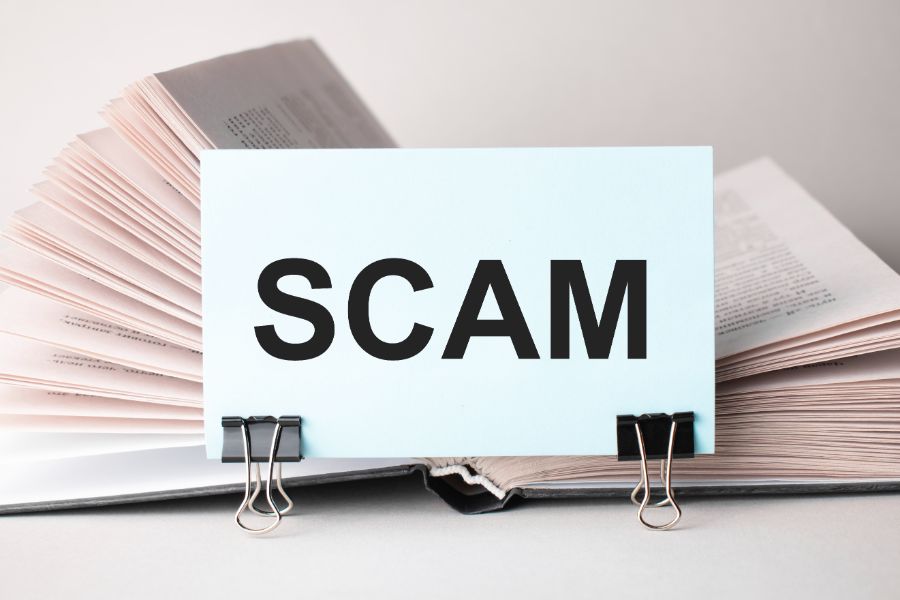American authors are losing an enormous amount of income to bookselling scams. And even though reputable online platforms such as Google, Amazon, and eBay are doing their best to bring these scammers down, the process is complicated.
Also, it can take a long time, sometimes even years, for authors’ earnings to be restored after the book sale scams are done. But what precisely is causing the bookselling scams? Who is to blame: the scammers or the publishing industry itself? And how can authors protect themselves?
This guide will show you everything you need to know. Let’s begin.

The Frustrating Tactic In Bookselling Scams
According to the Authors Guild, the authors’ median income from writing has reduced by 42% in the last ten years. And one of the reasons why it has declined is due to plagiarism prevalent in the industry.
In some instances, scammers reproduce the exact copy of the original and sell them directly to customers.
On other occasions, online platforms such as Google, eBay, and Amazon can’t tell the original books from counterfeit ones. And that’s because the scammers use the original author’s name. These bookselling scams are called doppelganging.
Doppelganger is more challenging for these online platforms to find because algorithms usually can’t identify nuanced distinctions between authors’ names.
Let’s take an example. Author doppelganger is legal, the same way using the same title on a different book (title cloning) is legal. And that’s because, typically, you can’t copyright a person’s name or a title.
Copyright Protections Seem Not To Work Against Bookselling Scams

Even though authors have put in much effort to stop these book sale scams, they seem to be losing the battle. And despite authors seeking help from the law, hoping to get protection from scammers, it might not be working.
Just like what happens in academic publishing, the problem in the book-publishing industry comes from peer pressure.
Publishing houses catered to bookstores and libraries interested in buying only entire catalogs, thus began using self-publishing tools instead of focusing on readers.
Even though it gave authors more freedom, it also exposed them to book sale scams. And that’s because single authors don’t have the resources to monitor their book sales activities online or have the legal resources to track scammers.
In addition, outdated intellectual property laws prohibit books and material production that should be readily available to the public. This move prevents publishing tools and presses from competing openly to suit customers’ preferences because they can’t provide different editions.
Of course, this puts much pressure on the author, which puts them at risk of losing their work to bookselling scams.
In the next section, we’ll show you the strategies these scammers use. That should help you be on the alert and take preventive measures.

How Bookselling Scams Work
1. Using The Reputation Of Publishing Influencers
These days, it’s easy to find publishing influencers online. Just search for the best sites for indie authors, and you’ll get loads of them. However, in between the real influencers, you’ll also find scam sites whose primary purpose is to con new authors to scammy vanity presses.
These scammy sites come up with compelling ways to make them look legit. They can include trusted names so that real influencers can share the list. So before you check out a publisher:
- Ask any of your writer friends if they’ve heard about the publishing firm
- Check their reviews thoroughly to see if they’re legit, and
- Use Writer Beware and similar sites to check out a publisher
2. Using The Solicitation Tactic
Most scammers call or email you out of the blue as their “marketing strategy.” Usually, they’ll say that your book was recommended to them or one of their book scouts discovered them.
Sometimes, they’ll make a bold move and act as literary agents to transition you to a traditional publishing contract or represent you to Hollywood. Another thing you’ll realize from their phone solicitors is their foreign accents; most of them are in the Philippines.
Email solicitors use recurring job titles such as Executive Literary Agent, Book Scout, Senior Marketing & Publishing Consultant, Senior Literary Agent, Marketing Supervisor, Marketing Professional, etc.
The top sign of a scam is a solicitation. Of course, real literary publishers, marketers, and agents usually don’t do that. If they don’t already represent you, they won’t reach out to you. But the solicitation method is the primary recruitment mode for scammers.
So if you get any solicitation, regardless of who it’s from, you should tag it as a red flag.
3. Offers To Re-Publish Your Books
Another scam you need to look out for is how they approach you when you’re already published. These scammers claim they can do a more critical job, offer higher credibility, or even get you in front of traditional publishers.
The scammers usually use the re-publishing tactic as a prerequisite to pitch a book to film studios or traditional publishers.
4. Boastful Claims About Experience And Skills
There’s nothing wrong in saying you’ve been in business since 2006 or have 15 years of experience. But these claims didn’t pan out when your domain name was registered a year ago.
These so-called publishing firms may say they’re staffed with marketing and publishing experts with years of “combined experience.” But they don’t provide any bios or names to help you verify this fact. So it would be best if you were wary when you see these signs
Sometimes, the “About Us” page of these scammers has nothing relating to the “about” of the company. But they may have a well-designed website that can throw you off scamming scent. So it would help if you were extra vigilant when verifying these facts.
5. Poor Grammar And Syntax Errors

These scammers have US-based companies and US addresses, with many of them having US business registrations. However, their websites and emails usually contain numerous grammar and syntax errors. Sometimes, it’s pretty laughable.
The phone solicitors use US numbers, but they frequently have foreign accents and sometimes get authors’ book titles and names wrong.
6. Using Names Of Respected Publishing Professionals
You can mass spam the general public with tweets and press releases for zero dollars. But scams do precisely that for thousands of dollars a month. These scammers don’t hesitate to use fraud to sell their services, and they do so by using famous and reputable publishing professionals.
Most times, they use their logo and the name of the publishing firm. So if you’re not alert, you can fall right into the trap. If someone or a company claims to be from a well-known publishing company or has worked with them, you should verify if it’s true.
Don’t make any decisions until you’re sure. Here’s an excellent example from Victoria Strauss’s The Impersonation Game.
Whenever you’re unsure about a publishing company or an individual, you can always contact Writer Beware. They may have received complaints or heard something that can help you.
Final Thoughts
The number of bookselling scams out there and the cleverness and variety of these cons is breathtaking. It’s also heartbreaking to have someone take away something you’ve worked hard for. Even though platforms like Amazon are doing their best, it’s not sufficient. So we recommend following the tips outlined in this guide. It’s better to take matters into your hand than leave it to an algorithm. If you follow the tips, you’ll be well-equipped to safeguard what belongs to you.
